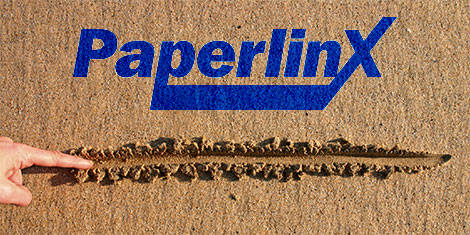With most of the company’s British division now under voluntary administration, Paperlinx chief executive Andy Preece is confident the remaining Australian and Asian businesses will be unaffected as British creditors vie to recover their funds.
The future of other European Paperlinx units remains less clear, other than the news that Dutch bank ING will continue supporting Paperlinx’s Dutch facility until April 15 in the hope that the business can be sold.
Preece has declared that the paper merchanter is “OK” having now “drawn a line in the sand” after sinking more than $100 million into its struggling British operations for no reward over the past five years. Preece has also stated that the company would continue to develop its signage, display print and packaging businesses.
What is patently clear is that the near 700 people who have lost their jobs in the UK, many of whom will have mortgages to pay and mouths to feed, will undoubtedly be living through something rather more seismic than a line being drawn in the sand.
The timing – an April Fools day announcement followed immediately by the traditional family time of Easter – was unfortunate. The reported treatment of staff at their Northampton HQ on April 1st, where they were corralled into two separate rooms prior to being told their fate, is perhaps more distasteful than unfortunate.
Of course there is no easy way to inform hundreds of people that they no longer have jobs – but for staff to find themselves in a room, waiting for answers, and whilst waiting nervously for that clarification they then find that their company emails have been shut down, is indicative of a sensitive situation that has been dealt with in an extremely clumsy and insensitive manner.
A Summary of the current situation at Paperlinx
Joint administrators Matt Smith and Neville Kahn, of Deloitte UK, said 14 out of the company’s 19 British sites would be closed, with the aforementioned loss of up to 693 jobs.
Paperlinx cited tumbling margins, legacy pension liabilities and the withdrawal of support from a credit insurer that meant suppliers would not be covered.
“The issue was an irrecoverable cash decline which left the local directors unable to maintain their creditor obligations,’’ Mr Preece told The Weekend Australian. He said while Deloitte was working “exclusively for the creditors to maximise returns’’, the banks had no recourse on the company’s assets elsewhere.
According to Paperlinx’s half-year accounts, the company carried $243m of borrowings, by way of “regional asset backed facilities’’.
“Deloitte is looking at a UK-specific creditor pool,’’ he said.
“There is a high degree of financial separation between the Australian and NZ entities and the UK and European entities.
“The businesses are well managed and highly profitable with sufficient liquidity and certainly no problem with covenants.’’
Mr Preece said the company would “fully disclose” the British debt position when the Deloitte process was finalised.
A key catalyst was Dutch bank ING’s decision to terminate a credit insurance facility for the British operations.
ING will continue supporting Paperlinx’s Dutch facility until April 15 in the hope that the business can be sold.
“Although a formal sale has commenced, Paperlinx is not currently in receipt of any binding proposal in relation to a potential sale of Benelux or any other European business,’’ Paperlinx says.
Paperlinx lost $90m in the December half, including $63m of asset and goodwill impairments. The European business lost an underlying $22m.
In 2013-14, the British and European operations combined accounted for $2 billion, 70 per cent of Paperlinx’s total revenue of $2.6bn.
While the British revenues are not separately disclosed, they are understood to be substantial.
Mr Preece said the Australian and NZ division, which operated under the Spicer’s Paper banner, was “absolutely’’ profitable.
The former head of Paperlinx’s local and Asian operations, Mr Preece was appointed to the top job in February after incumbent Andrew Price’s contract was “terminated with immediate effect’’.
Paperlinx demerged from Amcor in April 2000 and it soon became a market darling with its shares peaking at $5.85 in September 2003.
As the company shifted its focus on global paper merchanting, Paperlinx sold its Victorian papermaking operations to Nippon Paper for $500m in 2009.
However, Paperlinx was hit by a blizzard of woes including unfavourable currency movements, declining paper demand and an unresolved issue with hybrid security holders seeking to be bought out at a favourable price. Paperlinx shares last traded at 1.7c each, giving the company a value of $11m.
Mr Preece acknowledged the “stress and anxiety” for the workers — 23 per cent of the company’s total workforce — slated to lose their jobs. “It’s a difficult situation but tough calls had to be made,’’ he said. “The status quo wasn’t really palatable, either.’’
He said the company would develop its signage and display and packaging businesses.
Paperlinx shares have been on trading halt since March 26, when it disclosed a possible breach of banking covenants with one of its financiers in Europe. They resume trading on Wednesday.



